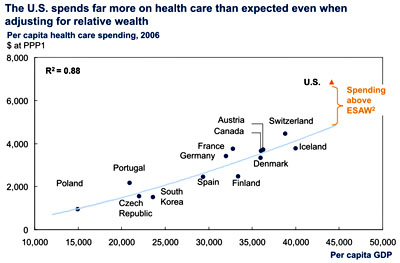Matt Yglesias is basically right about the overall shape of the river when it comes to healthcare spending:
I think there’s a lot of waste in our health care sector. That said, I think discussion of health care costs sometimes ignore the fact that something has to go up as a share of GDP. Americans are getting richer, agriculture is becoming more efficient, apparel is increasingly made by Bangladeshis or robots, etc. At the same time, computers and other electronic gadgets are getting cheaper in real terms. And if some things shrink as a share of our income, other things need to grow. The biggest of those things has been health care. And that makes perfect sense.
As GDP goes up, and we have more collective income to spend on things other than the basics, we’re going to spend that extra income on whatever we most value. And for a lot of us, that something is healthcare.  Put simply, as GDP per capita goes up, we’d expect healthcare spending not just to go up, but to go up even as a percentage of GDP.
Put simply, as GDP per capita goes up, we’d expect healthcare spending not just to go up, but to go up even as a percentage of GDP.
However, there’s evidence that the U.S. is an outlier even when you take this into account. You’d expect America to spend a higher percentage of GDP of healthcare than most countries because America is richer than most countries. But if McKinsey Consulting is to be believed, that number probably ought to be about $5,000 per person, not the $7,000 per person we actually spend. Put another way, you’d expect a country as rich as the U.S. to spend 13-14% of GDP on healthcare, but in reality we spend more like 17-18%. You can read the McKinsey conclusions here, or you can read Aaron Carroll’s multipart blog series explaining it here. (Note that these are 2006 numbers. They’ve gone up a bit since then.)
Why do we spend so much? Some is pure waste, some is because our system is so inefficient, and some is because the healthcare industry is far more profitable in the U.S. than in most other countries. Somebody has to pay for those country club memberships, after all.
But keep in mind that this is actually good news if you look at things from a certain point of view. If our healthcare sector were super efficient, there wouldn’t be much scope for reducing its size. But if there’s lots of fat in it, there is. It won’t be easy, since one man’s fat is another man’s dividend check, but at least there’s fat to cut.

















